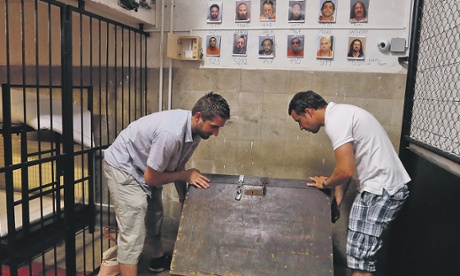
There are worse things that can happen on a city break than getting locked in a room, I tell myself as I frantically try to piece together a grid of pattern-covered squares, hoping it will reveal the code to the last combination lock. George (an esteemed colleague on the Guardian Data team, chosen for his numerical nous) has just knocked one of the pieces off the table and I’m beginning to doubt his value as a team member, but with minutes to go the answer reveals itself. We unlock the box, grab the final piece of treasure and dash for the door.
I’m at Lock’d, London’s newest room escape game venue, and one of hundreds opening in cities all over the world. For the uninitiated, room escape games are immersive experiences where players are voluntarily locked in a room filled with cryptic puzzles that have to be cracked. They’ll all be on a theme: for example, I’ve just “broken into a museum” to recover some ancient artefacts.
The games first appeared in the late noughties, as puzzlers experimented with creating real-life versions of popular video games, but in the past two years their popularity has snowballed. Now, they are among the most popular attractions on Tripadvisor in cities from LA to Bangkok. A generation brought up on The Crystal Maze has come of age and they really, really want to play.
“People are sick of entertainment that isn’t real,” Alexander Shaf, one of the founders of Lock’d tells me – once I’ve escaped, that is. “People play computer games and spend more and more time online. Now they’re realising it’s more fun to try these games in real life.”
Although room escape games have a dedicated following among gamers and are a popular corporate bonding activity (escape the room ... and your boss!), the games have already made their way onto must-do lists in many popular city break destinations. In Budapest, for example, more than 30 room escape games have opened in the past few years, with tourists clamouring to give them a try. New venues continue to open across Europe, in cities such as Prague, Berlin and Amsterdam. Last year saw the first Lisbon venue, when João Santos and Anna Mendes opened Lisbon Escape Game in Cais do Sodré.
Paul Bart is the founder of Escape Hunt, based in Malaysia, which has 21 branches around the world, with a further 55 planned for this year. A psychologist, Bart puts the popularity of the games down to a handful of innate desires: “People like to compete, and they like to interact with their environment. Look at the cinema, it started off silent, then they had the talkies, then it went 3D and now there’s 4D. People got bored with the sedentary and want to interact. This interaction is what makes it extremely addictive.”
But European and Asian games differ in style, he says. “With the European style, which has its roots in Hungary, you have your own dedicated room, you’re not mixing with other people and it’s a lot more genteel. In Asia, it’s completely different. Y ou have more blood, screaming and it’s a lot more sensational. There’s one in Bangkok called the Nazi game. You wouldn’t get away with that anywhere else.”
Their popularity did get a bit out of hand, he admits. “If you typed in any city in the world on Tripadvisor, the number one thing to do was an escape game. They’ve had to change their algorithm and put us in a separate sub-category now.”
But whether they will ever be viewed with the same regard as a city’s more traditional attractions or not, they seem to provide a welcome alternative to travellers.
Danielle Brennan, 26, tried a room escape game for the first time on a visit to Budapest last year and her group enjoyed it so much they tried another one the very next day. “We just wanted to try something new,” she says. “It was like Fort Boyard meets Saw and you got a free beer. Incredible!”

